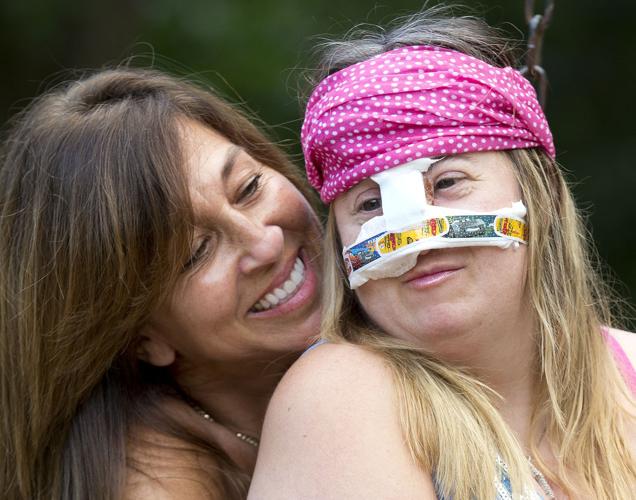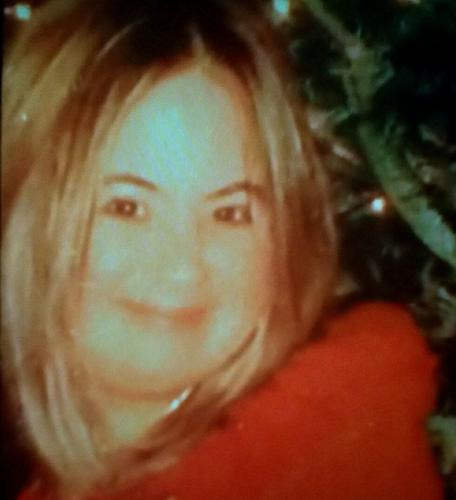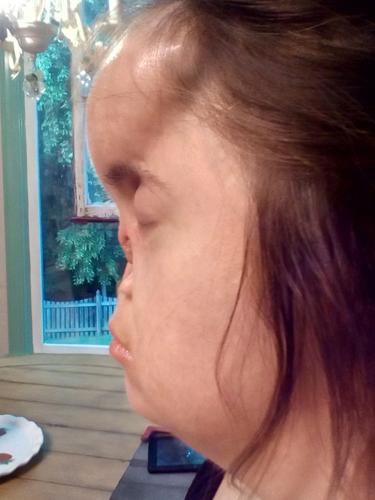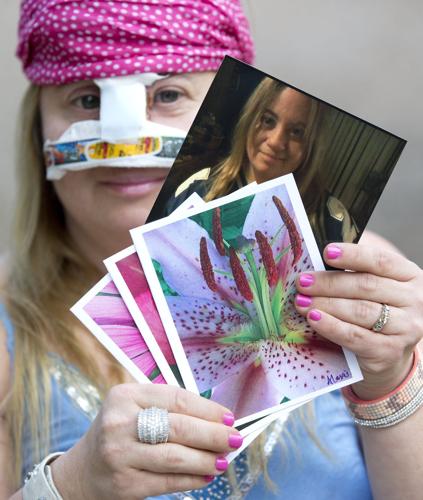GREENSBORO, North Carolina — He missed her eyes by about a quarter of an inch.
Oklahoma — a puppy when the family got him — growled suddenly, then pounced on Alexis Dermatas, who had been petting the yellow lab this past January as she sat with her dad watching television, as she had hundreds of afternoons before.
Lunging at Dermatas, the 8-year-old dog they always thought of as a teddy bear inexplicably sank his bottom fangs into the 40-year-old woman’s skull, ripping open the left side of her face and biting off her nose.
Someone grabbed a towel to cover what remained of her face, and family members rushed Dermatas past check-in and through emergency room doors at Moses Cone Hospital to doctors who immediately started working on her.
A hospital chaplain stepped into the room and said a prayer.
“Blood was coming from so many places,” recalled older sister Anna Dermatas, who collapsed on the hospital floor. “We thought she was going to die.”
• • •
The trauma surgeon would have to wait hours until Dermatas was stabilized enough to try to stitch together what she could of her face.
There was nothing from where her nose should have been to her skull, although nasal cavities allowed her to breathe.
“I was looking at someone who was numb and stunned,” family friend Kiki Tarasidis said. “There was a helpless side to her that you just don’t normally see.”
The severity of what happened to her is rare, but so is Alexis. A local Greensboro celebrity of sorts, the former homecoming queen, who has Down syndrome, earned 14 gold medals in the Special Olympics golf competitions, is a longtime Salvation Army bell ringer and volunteers at the annual Greek Festival at her church, Dormition of the Theotokos Greek Orthodox Church. Her fingerprints are all over the community.
In the throes of the unknown that day, without doctors even having a nose to reattach, she would signal in a very Alexis sort of way that she had the fight in her to survive.
After not saying a word for hours, and nearly choking on her blood in the emergency room, Alexis grabbed the arm of the person moving her to an operating room.
“Can I,” she said matter-of-factly, “order a Jennifer Aniston nose?”
• • •
It’s now easier for Anna Dermatas to laugh about that moment.
Actually, Anna and Alexis do a lot of laughing while seated on a park bench with children playing in the distance. They come here only in the evening because Alexis has to stay out of the sun with her new skin. Anna’s longtime service dog, Boomer Bear, who has been at Alexis’ side since the attack, sits between them.
The women are like Lucy and Ethel at times, and at others, protective big sister to adoring little sister. Anna, an artist, will try just about anything to keep Alexis smiling. Alexis often playfully rolls her eyes at the antics.
“Every single day,” Anna told her at the hospital, “I’m going to put a smile on your face.”
Sometimes that’s loudly launching into revamped lyrics to the ’70s hit “Hot Child in the City,” and then smothering her younger sister in a hug.
Despite having lupus, an often energy-depleting medical condition, Anna has resolved to get her sister through this.
Tragedy hasn’t brought them closer together. They’ve always been close.
The two have been stuck at the hip since their parents brought smiling Alexis home from the hospital. Anna was 10 at the time.
Alexis, who arrived early and underweight, had spent a month in an incubator. Anna jumped at the chance to be her big sister.
When Anna got her driver’s license, their parents put a car seat in the back.
When Anna went to football games, her younger sister was in the stands.
Despite the diagnosis of Down syndrome, an intellectual disability, their parents enrolled Alexis in a Montessori-style elementary school, where she would get additional support and could move at her own pace.
The teen years were especially tough, Anna recalled.
“She would come home and cry every day and lock herself in her room,” she said.
Her baby sister told her how she sat alone at lunch.
So Anna picked Alexis up early from school one day and took her to visit the McIver Education Center, a school at the time for special-needs students.
Walking down the hall, they came across two boys, also with Down syndrome.
They spoke to Alexis, who returned the smiles.
“Anna, this place warms my heart,” she said.
• • •
And Alexis blossomed.
She wasn’t afraid to raise her hand in class.
She was editor of the yearbook.
She wore cowboy boots for line dancing at school.
She later competed in Special Olympics, which she waited for each year like Christmas.
The sisters teamed up in golf at the sports competitions, which allows the athlete to pair up with another player who is not intellectually disabled. Both of the women had learned the game from their dad, who took them almost daily to the driving range.
“They were on the 18th hole and Alexis made a 55-foot putt and because of that putt, they won the gold medal that day,” recalled David Sheets, who at the time was a volunteer golf coach for the Special Olympics games.
Alexis had previously won a gold medal in gymnastics, before the golf competitions were added.
“I could always hear Anna (over the crowd),” she said with an exaggerated sigh.
When she wasn’t playing, Alexis was in the stands cheering on other athletes, even those she didn’t know.
“The other golfers from the other towns and cities … they really enjoyed being around Alexis because she had so much personality,” Sheets said.
She was always looking for ways she could volunteer in the community. She has a planner with the dates of events. And while others might use hammers and nails during Habitat for Humanity housing builds, she helps make lunch and passes out sandwiches to volunteers.
“She’s helped people her whole life,” Anna said. “She’s always wanted to.”
Those gifts and talents are sometimes on special display in other ways.
She was always in her big sister’s garden taking pictures with a $25 smartphone.
Anna Dermatas asked to look at the pictures on her phone one day and was stunned.
Those shots came from sticking her phone deep into the flowers, even capturing the dew at times.
“It looked like pictures out of National Geographic,” Anna Dermatas said. “I said, ‘Alexis, oh, my God, you can make a killing selling these.’ ”
So they went to Office Depot and made them into photo note cards, which they bound together in sets of 12 with twine. She sold them during the annual Arts and Crafts Festival at the Greek Orthodox Church. A friend of theirs made a giant poster with the flowers as a backdrop.
“What do you want to call your business?” Anna Dermatas asked her.
“Flower Child,” her sister responded.
In 2ƒ hours that day, she sold out of them, at $25 a pack, from people simply browsing the table.
In many ways, Alexis is much like the people she comes across, simply living out her life.
“She has no idea, based on her life, that she is a special-needs adult,” said Tarasidis, who got to know Alexis in 2001, when Tarasidis’ family moved to Greensboro and Alexis was the first person who greeted her at the Dormition of the Theotokos Greek Orthodox Church.
“They’ve always pushed and encouraged and allowed and exposed her to feel as any other normal child,” Tarasidis said of Alexis’ parents.
Her independence shone through.
She got a job at a supermarket bagging groceries, where she made friends of customers.
She took shopping sprees by herself at the mall.
She went on dates with her boyfriend.
Up until the dog attack, the young woman, whose musical tastes range from Frank Sinatra to Florida Georgia Line and who knows every line of dialogue to every episode of “Friends,” also taught Sunday school to toddlers at the church.
“She’s like a heart with legs,” Anna said.
• • •
A lot has changed since the attack this past winter.
The household’s mirrors are covered up.
Alexis has temporarily put all her volunteer activities on hold.
She has looked at herself differently since the dog bit off her nose.
“She could walk in anywhere and just own it,” Anna said. “For this to happen, and for her to sit and say, ‘I’m a monster and I’ll never be beautiful again,’ just breaks my heart.”
Her dedicated parents, too, are broken for her.
Alexis spent only a couple of nights in the hospital and left with hundreds of stitches. For doctors to do anything more, the wounds had to heal.
It is very much on her mind.
“I cry every night,” Alexis said quietly, as she sat on the park bench with her sister.
And she prays every night.
Oklahoma was put down after the attack. No one will ever know what caused his actions.
Alexis, who was in a lot of pain, temporarily moved in with her big sister for the around-the-clock care she would need, including the hour it took each day just cleaning the mucus from her nasal cavities.
During a visit with a local trauma surgeon, Anna was given a card with the name of a pioneering nasal reconstruction specialist in Tucson who was known to take on difficult cases from around the world.
Alexis would be among the worst trauma cases seen by Dr. Frederick J. Menick, a former chief of plastic surgery at the University of Arizona College of Medicine and at the Veterans Affairs hospital in Tucson.
Gone were the skin, septum, cartilage and tissue.
“Rarely do you see such a very significant dog bite,” Menick said.
• • •
A prosthetic nose would have been possible, but limiting, especially for someone as active as Alexis. Fake noses often have to be redone every six months or so, Menick said.
And sometimes, they fall off.
Rebuilding her nose could involve as many as eight surgeries and cost more than $155,000.
And each time, it would require flying to Tucson, getting a hotel room for the two-week recovery and paying for all their expenses.
More important, they would have to pay cash up front, before each step along the way — to the surgeon, the anesthesiologist and for the hospital room.
The family didn’t have the money to simply write a check. Few people do. Medicare wouldn’t cover it.
By March, Anna and Tarasidis were in front of a laptop, setting up a GoFundMe webpage to raise money.
And people began responding.
“Alexis was my best friend in grade school,” one donor replied, “so sad to hear this has happened to her.”
Others felt the same way. Local blues musician and friend Chris Carroll, who has since died, had put out a bucket for Alexis during a performance at a local bar and raised $600. He pressed it in Anna’s hands earlier this summer.
“It shows how much good is out there, still,” Anna said.
And by April the first procedure was underway, despite there being less than $20,000 in the GoFundMe account.
“I’m going to say it’s 100 percent faith,” Tarasidis said of moving forward.
• • •
Menick had gotten the plea for the Jennifer Aniston nose as well.
“I told her that my goal is to give her a nice-looking nose,” he said.
He started by putting a balloon implant in Alexis’ forehead in an effort to grow more skin that could be later fashioned into a nose. He also inserted a port, which would later be used to expand the balloon with saline injections.
Once she returned to Greensboro, a local doctor would make weekly injections for more than two months.
The process would give Menick enough hairless skin from which he could cut out a pattern for what would become her nose.
By the time the sisters flew back to Tucson in June, Alexis’ forehead had grown the size of a small cantaloupe, giving the doctor enough new skin to work with.
During the 11-hour operation, he also took bone and cartilage from her ribs, which he would use to build a septum for the nose and to form nostrils.
The nose is loosely stitched around the sides and bottom of her face.
“It’s basically like a nose-work station,” Anna explained. “He’ll undo the nose and lift it up like a car hood and keep doing the surgery.”
Among other things, Menick will take tissue from under the skin to line her nose.
“It’s like watching a miracle,” Anna said.
• • •
Life is regaining some normalcy for Alexis and perhaps in surprising ways.
With it being so quiet around the family home, Anna decided it was time to get a puppy. The family always had pets.
Boomer Bear, Anna’s service dog, had been in the car when she brought Alexis home from the hospital. When she got in the front seat, Boomer moved from the back of the car to the front and started licking Alexis’ arm.
“Hey Boomer Bear,” Anna heard her sister say, “I love you.”
That was an important step in Alexis’ recovery.
“I think what Boomer Bear did was restore the trust she had in a dog, instantly,” Anna said.
The Dermatases did get another family dog.
He ended up being the runt of the litter. A kind of poodle mix.
So, there they were in the car with him, trying to think up a name. Then he started howling.
Little sister looked at big sister and exclaimed: “Elvis!”
And down the road the Dermatas girls went, momentarily away from the pain and worry, singing, “You ain’t nothing but a hound dog” at the top of their lungs.







